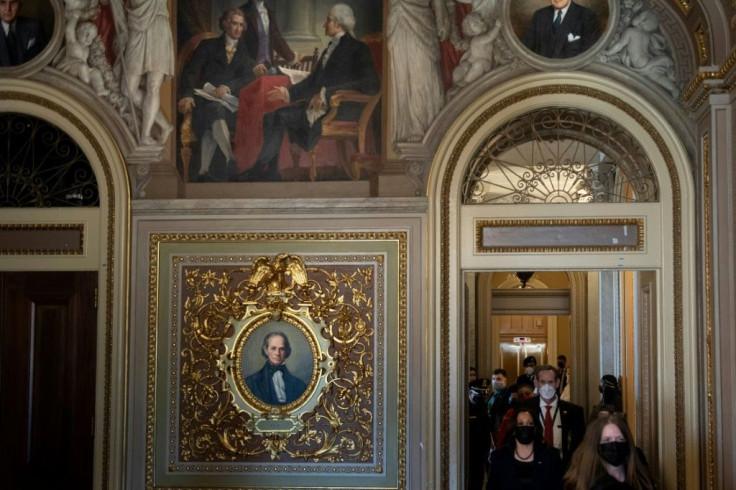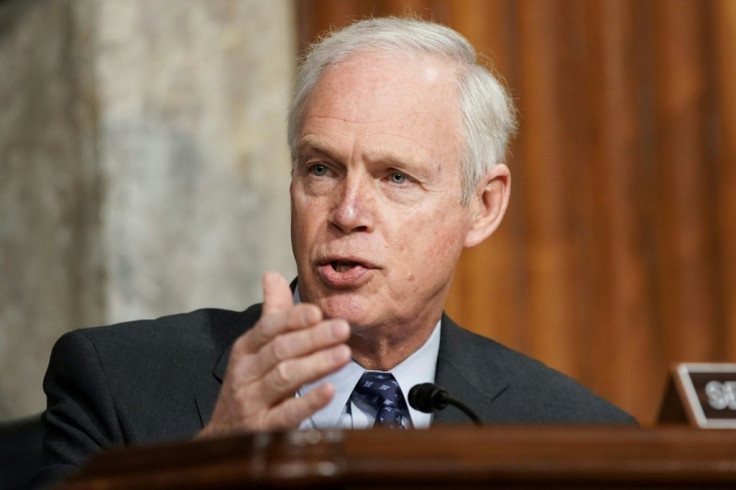Reading Aloud Of 628-page Covid Bill Delays Debate In US Senate
The US Senate finally took up the $1.9 trillion Covid relief package Thursday but a brazen ploy by opponents -- reading the entire 628-page bill aloud on the chamber floor -- promptly gummed up the action.
President Joe Biden has pushed hard to get his top legislative priority through Congress, and it narrowly cleared the House of Representatives last week.
But instead of the upper chamber launching directly into debating the measure aimed at helping millions of families and boosting a crippled economy, Republicans halted the process for hours by demanding that clerks recite every word of the ambitious plan.
Republicans already appeared united in opposing the proposal over its high cost, and lawmakers braced for marathon days that will include up to 20 hours of debate and a lengthy list of amendments that will force contentious votes before the bill's final passage.
But Biden has been desperate to implement its key elements, including direct checks of up to $1,400 for most Americans, funding for vaccines, expanded unemployment benefits, resources to help open schools quickly and money to hard-hit businesses and communities.
With the chamber deadlocked at 50-50, Vice President Kamala Harris broke the tie to allow debate to begin.

The process immediately hit a snag when Republican Senator Ron Johnson called for a full reading of the coronavirus package.
The recitation, estimated to take about 10 hours, proceeded uninterrupted deep into Thursday night with clerks taking turns reading the dry, technical language in a monotone that threatened to put lawmakers and others to sleep.
Debate on the package, which Democrats argue is the best way to combat the pandemic, may only begin well after midnight.
Bill readings are almost always dispensed with at the start to allow for debate, but Johnson saw it as way to register his frustration over the massive outlay of federal spending.
"I feel bad for the clerks that are going to have to read it, but it's just important," said Johnson, who has already faced criticism this week for suggesting the deadly January 6 US Capitol riot was not an "armed insurrection."
"Why are we authorizing another $1.9 trillion when we still have a trillion dollars sitting on the sidelines" unspent from the previous pandemic relief bills? he told reporters.
"It's actually hard to spend this much money."

After debate, Republicans will introduce multiple amendments to the bill in a process known as a "vote-a-rama," in which senators can propose unlimited numbers of amendments.
Republicans aim to delay if not scupper the bill, so senators are bracing for a vote-a-rama that could stretch into the weekend or next week.
One big question is whether Democrats can stick together on such a huge amalgamation of priorities.
Senate Majority Leader Chuck Schumer expressed confidence that they will, and insisted Democrats were "delighted" with Johnson's stunt.
"If the senator from Wisconsin wants to read it, let everybody listen because it has overwhelming support" among the American public, Schumer told the chamber.
"No matter how long it takes, the Senate is going to stay in session to finish the bill this week."
Senator Lindsey Graham, one of many Republicans complaining that the package is an overstuffed liberal wish list, sounded unperturbed about the potential for a drawn out fight over Biden's signature early priority.
"I think we're going to be judged by the quality of what we do, not how long it takes," Graham told AFP.
The bill has already suffered a Democratic setback, with the $15 minimum wage language in the House bill ruled ineligible for the Senate version under its budget reconciliation rules.
mlm/dw
© Copyright AFP 2024. All rights reserved.







